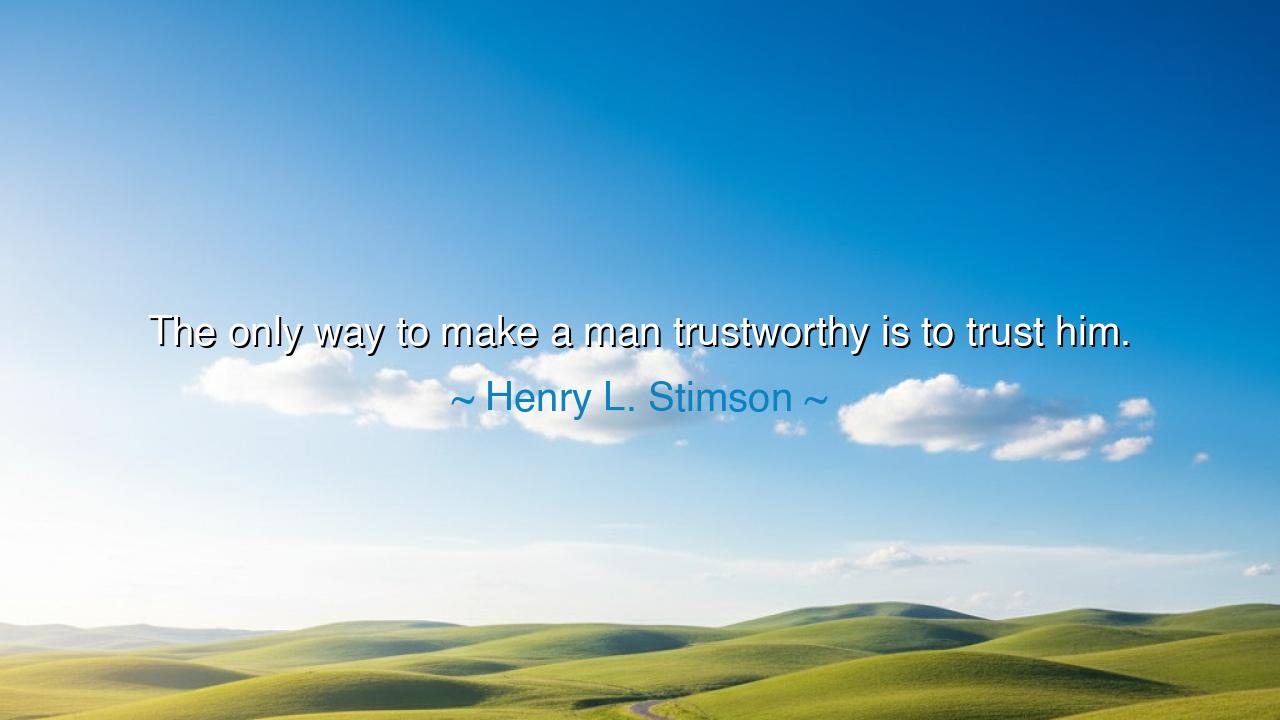
The only way to make a man trustworthy is to trust him.






The words of Henry L. Stimson—“The only way to make a man trustworthy is to trust him.”—ring with the strength of paradox, yet they conceal a truth older than empires. They remind us that trust cannot be forged by suspicion, nor loyalty born from chains. For the heart of man is a mirror: if you reflect doubt upon it, it will return deceit; but if you shine upon it the light of trust, it will often rise to meet that light with honor. Thus, Stimson speaks not of naivety, but of the deep power of confidence given freely, which has the power to transform.
The ancients knew this truth well. The Roman historian Tacitus declared that suspicion is a self-fulfilling prophecy, for to treat all men as traitors is to make them so. Kings who bound their subjects with fear often reaped betrayal, while leaders who entrusted their people with dignity won loyalty that endured even through hardship. Trust awakens a man’s better nature, calling forth responsibility and pride. To trust is to give a man the chance to rise to his highest self.
Consider George Washington, who in the bitter winter at Valley Forge entrusted his ragged soldiers not only with their own survival, but with the cause of liberty itself. He did not rule them with lash and suspicion, though starvation and despair might have justified harshness. Instead, he placed his faith in their endurance, and they, seeing his trust, bore sufferings unimaginable, until the revolution was carried forward. Washington understood Stimson’s truth: to make men trustworthy, you must first trust them.
History also warns of the opposite. Leaders who distrust those beneath them often find their fears fulfilled. Stalin, consumed with suspicion, spied upon his generals, imprisoned his allies, and purged his own ranks. In his mistrust, he destroyed the very bonds of loyalty that might have held his nation secure. His empire did not produce trustworthiness, for he never trusted. Instead, it produced fear, deception, and treachery. Here we see Stimson’s wisdom in stark relief: trust is the soil where trustworthiness grows; suspicion is the poison that destroys it.
Yet this teaching is not for rulers alone, but for all who walk among men. In families, in friendships, in communities, the principle holds: to demand loyalty without giving trust is folly. A child grows honest not when constantly doubted, but when believed in. A friend proves faithful not when tested with suspicion, but when entrusted with confidence. Even in the smallest matters, to trust is to call forth the nobility that lies within another’s heart.
But let us not mistake this wisdom for recklessness. To trust does not mean to ignore discernment. Stimson does not counsel us to pour confidence into proven deceivers or to blind ourselves to treachery. Rather, he teaches that when the ground is yet untested, the way to cultivate trustworthiness is to extend trust first, even at risk. For only by giving a man responsibility can you see if he is capable of bearing it. Without the chance to prove himself, he remains forever untried, forever distrusted, and perhaps forever unworthy.
The lesson for us is clear: trust creates trust. If we wish to live among honest, faithful people, we must first be willing to entrust them with our faith. In practice, this means giving opportunities instead of hoarding them, extending responsibilities instead of withholding them, and believing in the potential of others even before they have fully proven themselves. For it is this faith that awakens honor, and this risk that calls forth greatness.
So let Stimson’s words resound across generations: “The only way to make a man trustworthy is to trust him.” Do not let suspicion rule your dealings, nor let fear close your hand. Instead, extend trust, wisely but boldly, and watch as others grow into the weight of that gift. For trust given freely is not a weakness, but a forge—one that shapes ordinary men into trustworthy ones, and builds a world where confidence and loyalty may endure.






AAdministratorAdministrator
Welcome, honored guests. Please leave a comment, we will respond soon